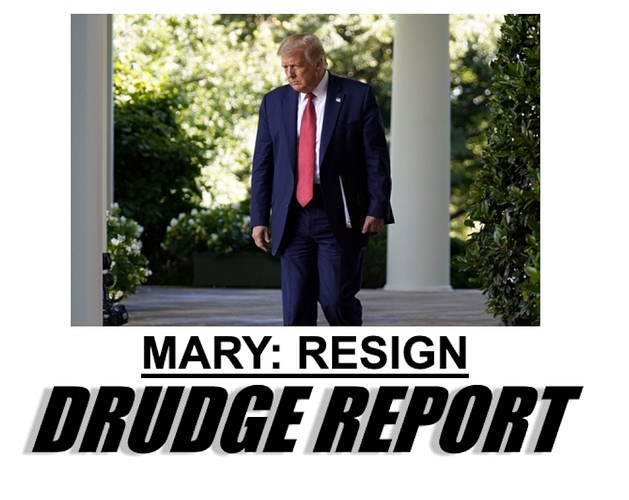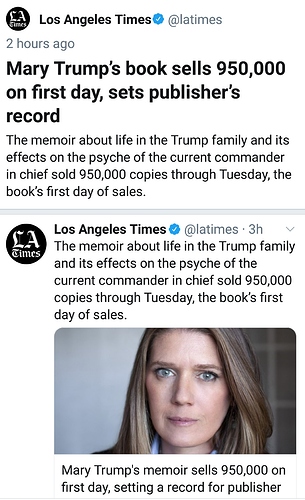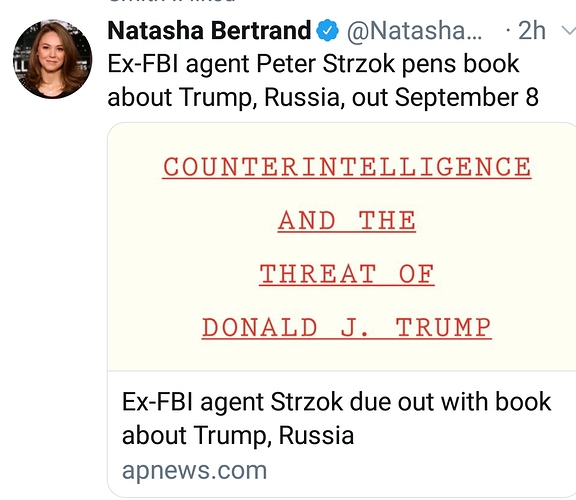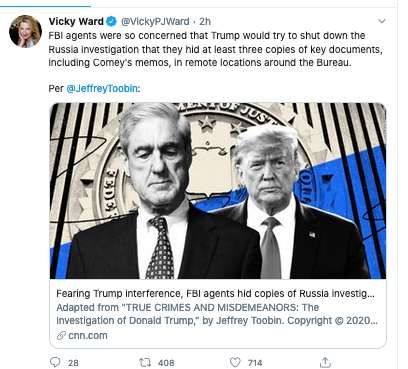Another new book comes out Tuesday Sept 1 (Disloyal - Michael Cohen is out 9/1/20 as well)
And Kelly is being the stalwart one, not taking an oath of loyalty.
Countless examples of how mismanaged T is.
Here are some revelations from Axios
Axios Sneak Peek
1 big thing: Trump offered FBI director job to Kelly, asked for loyalty
The day after President Trump fired FBI boss James Comey, the president phoned John Kelly, who was then secretary for the Department of Homeland Security, and offered him Comey’s job, the New York Times’ Pulitzer Prize-winning reporter Michael Schmidt reports in his forthcoming book, “Donald Trump v. The United States.”
Driving the news: “But the president added something else — if he became FBI director, Trump told him, Kelly needed to be loyal to him, and only him.”
- “Kelly immediately realized the problem with Trump’s request for loyalty, and he pushed back on the president’s demand,” Schmidt writes.
- “Kelly said that he would be loyal to the Constitution and the rule of law, but he refused to pledge his loyalty to Trump.”
Why it matters: This previously unreported conversation sheds additional light on the president’s mindset when he fired Comey. Special counsel Robert Mueller never learned of this information because the president’s lawyers limited the scope of his team’s two-hour interview with Kelly.
-
" In addition to illustrating how Trump viewed the role and independence of senior officials who work for him, the president’s demand for loyalty tracked with Comey’s experience with Trump," Schmidt writes.
Behind the scenes: Schmidt reports that “throughout Kelly’s time working directly with Trump, Kelly was repeatedly struck by how Trump failed to understand how those who worked for him — like Kelly and other top former generals — had interest in being loyal not to him, but to the institutions of American democracy.”
- “Kelly has told others that Trump wanted to behave like an authoritarian and repeatedly had to be restrained and told what he could and could not legally do.”
- “Aside from questions of the law, Kelly has told others that one of the most difficult tasks he faced with Trump was trying to stop him from pulling out of NATO — a move that Trump has repeatedly threatened but never made good on, which would have been a seismic breach of American alliances and an extraordinary gift to Putin.”
Quote of the book: “Kelly has said that having to say no to Trump was like ‘French kissing a chainsaw.’”
Another revelation: Schmidt reports that Mueller’s prosecutors made near real-time requests to McGahn’s lawyer, Bill Burck, to find out what the president was telling the White House counsel in their private conversations.
- In a summary of the reporting, Schmidt tells me, “This was a highly invasive tactic. Mueller’s team wanted to know whether Trump had a role in the firing of the acting FBI director Andrew McCabe and whether Trump was saying anything about prosecuting Comey.”
- “Trump was indeed discussing prosecuting Clinton and Comey, and McGahn had written a memo to Trump detailing why he should not be pressing the Justice Department for such a prosecution.”
My thought bubble: This kind of activity from Mueller’s team was far more invasive, in terms of information-gathering from the president’s inner circle, than any investigating that happened on the 2016 campaign.
The White House, Kelly and McGahn did not respond to requests for comment.
ADDING 8.31.20
– INSIDE THE RUSSIAN COLLUSION BRIEFINGS: “The American intelligence community watched these hacks but completely misunderstood them. They perceived them as part of intelligence-gathering operations. All the Russians were doing, the FBI and intelligence community concluded, was looking to learn what was going on behind the scenes. They had no clue that the true intentions were to weaponize the information. By the summer of 2016, the American intelligence community had little to no intelligence that the Russians had launched a disinformation campaign on the United States through fake social media posts and that they planned to deploy the stolen emails. In a classified briefing about Russia, Senate Majority Leader Mitch McConnell fell asleep.” Team McConnell denies this.
– MCGAHN STAYED, ANTICIPATING KENNEDY’S RETIREMENT: “Mueller’s office was now receiving contemporaneous information about Trump’s obstructive acts. Mueller’s team wondered, if Trump was doing this with McGahn – someone whom he had encouraged to cooperate – what else was the president doing to interfere with the investigation? Trump continued to complain to aides about McGahn and his refusal to correct the story on the attempt to fire Mueller. But the president largely left McGahn alone, and McGahn avoided Trump, which was a nice respite for McGahn.
“[William] Burck told McGahn that he needed to start putting the pieces in place to resign. McGahn, Burck argued, needed to be out of the White House by the time the report came out, because Trump was not going to like what he saw in it. But McGahn had mixed feelings about leaving. Yes, he was sick of Trump and all the chaos—and while he had a high threshold for pain, he could only take so much. But he had concerns about what Trump would do without him there. Who knew who would follow him as White House counsel? Was it really outside the realm of possibility that Trump could hire someone akin to Michael Cohen to succeed him? No, it was not. Who would be there to say no, to protect Trump from himself and the country from Trump? McGahn trusted [John] Kelly and thought he would serve as a firewall, but he did not want to leave him to do it alone.
“On a deeper level, though, McGahn knew that his chief mission in the White House – stacking the courts – had not been completed. And as someone who closely watched the Supreme Court, McGahn knew there could be a huge reason to stay: another open Supreme Court seat. Justice Anthony M. Kennedy had served on the court for thirty years. McGahn had built a close relationship with him during his time in the White House, with Kennedy often weighing in on possible nominations for judgeships in lower courts. Kennedy had said nothing to McGahn about leaving, but McGahn’s sense was that his time was near. So the possibility of Kennedy’s open seat gave him a reason to stay.”







